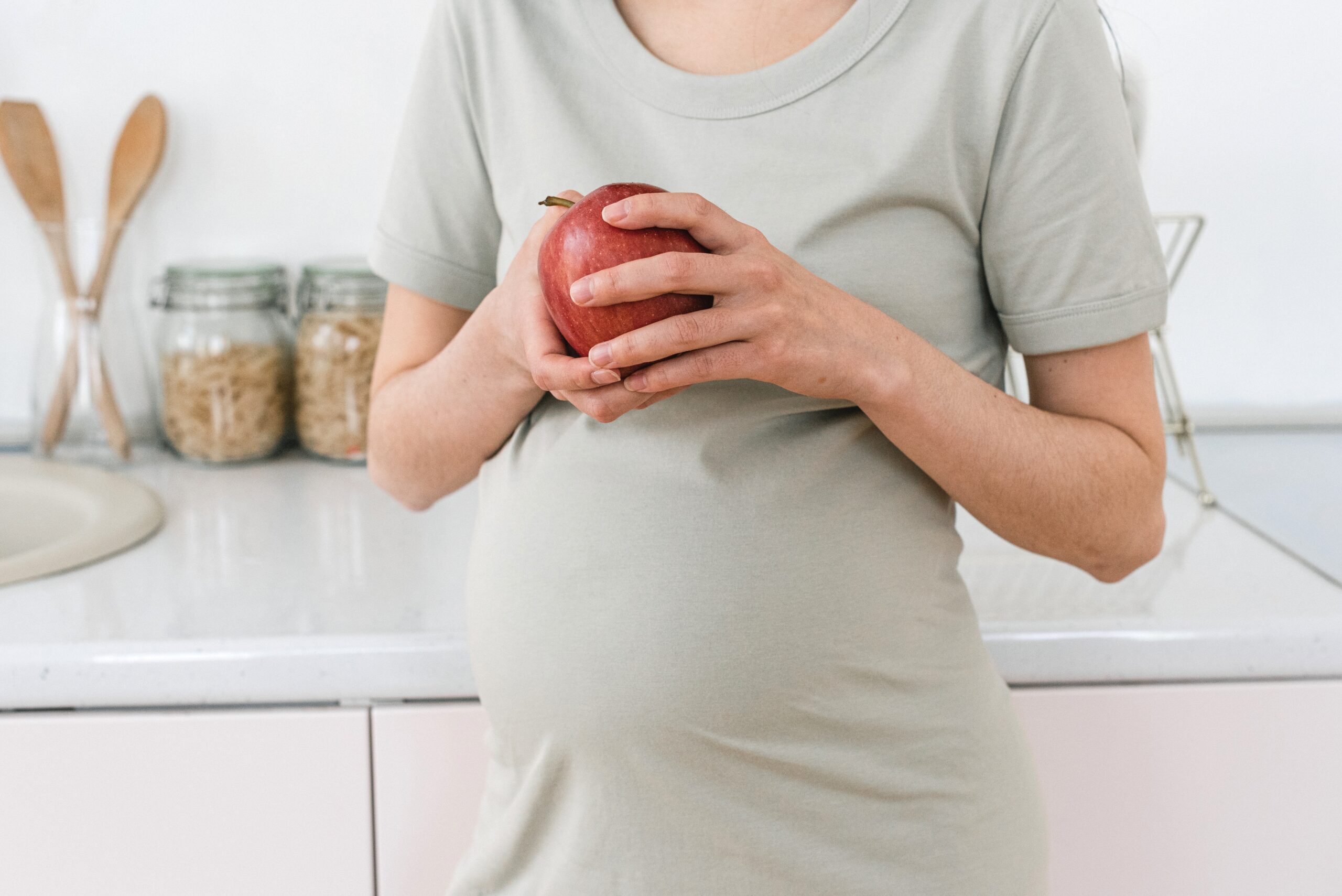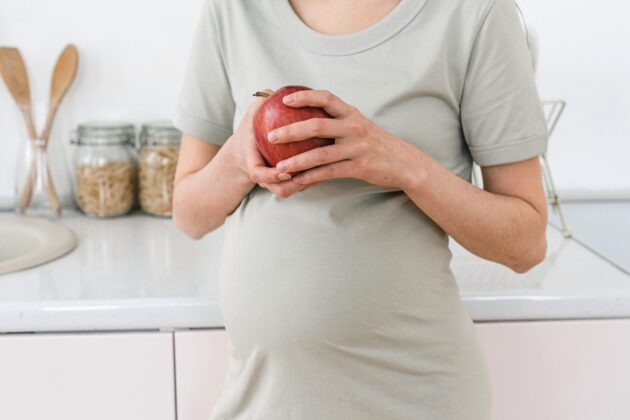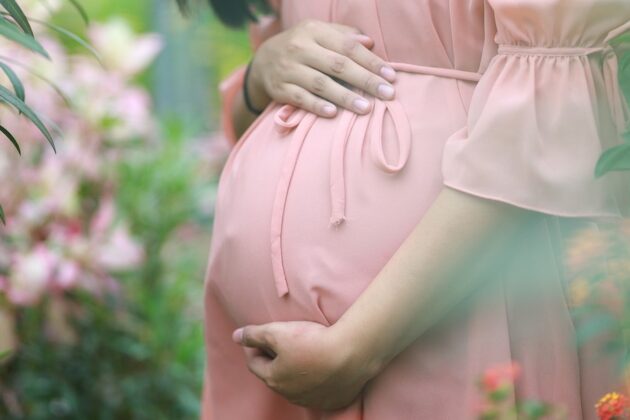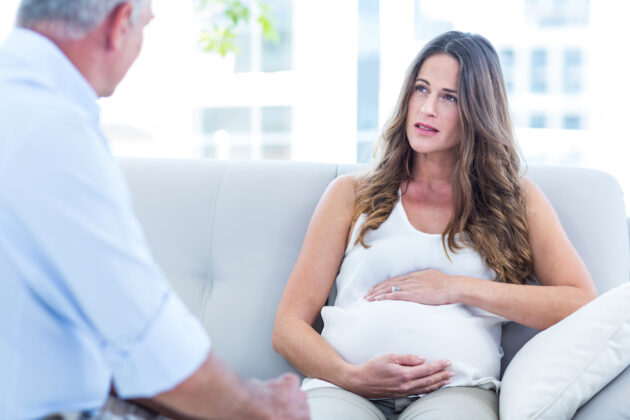Complications & Symptoms of Not Eating Enough During Pregnancy: First Trimester & On
Eating a healthy, balanced diet is important for everyone—but it is especially vital during pregnancy.
A woman’s body undergoes significant changes during pregnancy to support the baby’s growth and development. Adequate nutrition is essential to ensure a healthy pregnancy and baby.
Not eating enough during pregnancy can lead to various issues, such as fatigue, dizziness, headaches, constipation, and an increased risk of preterm birth or low birth weight. In some cases, not getting enough nutrients like folic acid or iron can also lead to congenital disabilities and other health problems for the baby.
Despite the importance of eating well during pregnancy, many women may struggle to maintain a healthy diet. Nausea, vomiting, and food aversions are common during the first trimester, while heartburn, constipation, and indigestion may become more prevalent later in pregnancy. Additionally, the demands of work and other responsibilities can make it challenging to prioritize healthy eating habits.
This guide provides information and tips for pregnant women struggling to eat enough during pregnancy. We cover the importance of good nutrition, common symptoms of not eating enough, and strategies for overcoming barriers to healthy eating.
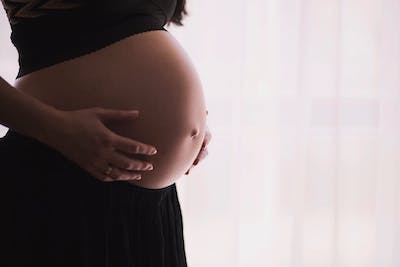
Healthy mom, healthy baby: Get support from a prenatal dietitian
90% of Zaya Care patients pay $0 for one-on-one counseling with a Registered Dietitan
Symptoms of not eating enough in pregnancy
Here are some symptoms of not eating enough during pregnancy:
- Not gaining enough weight. Failure to gain weight during pregnancy could be the result of poor nutrition or an underlying medical condition. Not gaining enough weight can impact the growth and development of the baby and increase the risk of complications during pregnancy and childbirth.
- Constant hunger. Feeling hungry is frequently a sign of insufficient caloric intake. Poor nutrition can impact the mother and the developing baby, resulting in nutritional deficiencies and potential health problems.
- Constipation. Fiber is an essential nutrient that promotes regularity and prevents constipation. When a pregnant woman does not consume enough fiber, her stool may become hard and difficult to pass.
- Nausea and vomiting. Vomiting and nausea can occur during pregnancy as a result of inadequate nutrient or calorie intake. When a pregnant woman does not consume enough food, her blood sugar levels may drop, resulting in nausea and vomiting.
- Headaches. A drop in blood sugar levels brought on by skipping meals or consuming too few carbohydrates can result in headaches.
- Low energy levels. Pregnancy can be physically and emotionally taxing. Low energy levels may indicate inadequate nutrition and can impact daily functioning.
- Tired/poor sleep quality. When you don’t eat enough, your body may become stressed out and release hormones like cortisol that make it hard to fall asleep or stay asleep. Low blood sugar levels can also make you feel restless, which makes it difficult to get a good night’s sleep.
- Mental health problems. Nutrition plays a critical role in maintaining healthy brain function. A lack of proper nutrition can cause imbalances in hormones and neurotransmitters, leading to mental health issues such as depression, anxiety, and mood swings.
- Lightheadedness. Lack of food may prevent your body from maintaining healthy blood sugar levels, which can cause lightheadedness, dizziness, or even fainting.
- Getting sick often. If a pregnant woman is not eating enough, she may experience a weakened immune system and be more prone to getting sick.
- Feeling cold. Not consuming enough nutrient-dense foods during pregnancy can lead to deficiencies that can affect the body’s ability to regulate body temperature. For example, low iron levels can lead to anemia, which can cause fatigue and cold intolerance.
- Food aversions. Food aversions can result in a reduced intake of certain foods and nutrients. For example, if a woman dislikes meat during pregnancy, she may not consume enough protein, iron, and other essential nutrients typically found in meat.
Other stressors, such as work or family demands, can make it challenging to prioritize healthy eating habits.
Complications of not eating enough during pregnancy
Here are some complications of not eating enough during pregnancy:
- Poor fetal growth. Poor fetal growth due to unsatisfactory nutrition can harm the baby’s health and development. Inadequate nutrition can increase the risk of low birth weight, preterm birth, and adverse effects on the newborn.
- Low birth weight. Infants born to mothers who do not eat enough during pregnancy may have a low birth weight, which can increase the risk of health problems for the baby. Low birth weight is a weight of fewer than 2500 grams or approximately 5.5 pounds at birth.
- Preterm birth. Women who do not eat enough during pregnancy may have a higher risk of preterm labor, which can be dangerous for the baby. Preterm labor is defined as labor that occurs before 37 weeks of gestation and can increase the likelihood of respiratory distress syndrome, infections, and other health problems.
- Anemia. Pregnant women who do not get enough to eat may develop anemia, a lack of sufficient red blood cells to transport oxygen to the body’s tissues.
- Maternal weight loss. Undereating during pregnancy can also lead to improper weight gain or even weight loss. Weight loss can affect the long-term health of both mother and baby.
- Miscarriage. Inadequate prenatal nutrition can affect fetal development and, in some cases, increase the risk of miscarriage.
Can not eating enough during pregnancy cause a miscarriage?
Nutritional needs rise dramatically during pregnancy. Poor nutrition in the mother may affect the growth and development of the fetus, increasing the risk of complications that could result in miscarriage. In general, losing weight during pregnancy is almost never safe, with some exceptions during the first trimester.
While further study is needed to establish the relationship between undereating and pregnancy loss, these results highlight the importance of prioritizing adequate nutrition. Pregnant women should concentrate on meeting their nutritional needs and work with their healthcare providers to accomplish this.
We asked Natasha Eziquiel-Shriro, RDN, if not eating enough during pregnancy can cause miscarriage. Here’s what she had to say:
Miscarriage can happen for many reasons. About 15% to 20% of known pregnancies end in miscarriage, although the chance of this happening drops to less than 5% by weeks 6 or 7 of pregnancy. Many newly pregnant mothers struggle to eat enough because of morning sickness, busy schedules, or old habits. It’s understandable to want to know if this is a concern, pregnancy feels high stakes.
Looking beyond just calories, undereating is not simply missing a meal (intentionally or otherwise). Missing out could be in terms of overall energy from food, or essential proteins, fats, vitamins, or minerals. For a healthy pregnancy, make time to eat a nutrient-dense diet, take a good prenatal to fill in any gaps, and speak to an integrative medical provider or registered dietitian if you are interested in more guidance.
A diet that’s regularly low in key nutrients can affect pregnancy and increase the risk for conditions like intrauterine growth restriction, preeclampsia, gestational diabetes, and preterm birth. If during pregnancy, you experience severe nausea and vomiting for over 4 to 6 hours, call an emergency line or visit an ER.
Causes of appetite loss by trimester
Pregnancy is a time of significant changes in a woman’s body, which can impact appetite and eating habits. Appetite loss during pregnancy is common and can occur for various reasons, from hormonal changes to physical discomfort.
Depending on the trimester, women may experience different symptoms or challenges related to eating. Understanding these challenges can help women manage their diet and ensure they get the nutrients they need for a healthy pregnancy.
By exploring the causes of appetite loss during each trimester, women can better understand their bodies and make informed decisions about their diet and nutrition.
Not eating enough during the first trimester
During the first trimester of pregnancy, many women experience a loss of appetite or changes in their eating habits. This experience is often attributed to hormonal changes during pregnancy, which can affect the senses of taste and smell and make certain foods unappealing.
Morning sickness is the most common reason for appetite loss during the first trimester and is experienced by over 50% of pregnant women. It typically involves feelings of nausea after eating and vomiting, and it can be triggered by different scents and foods.
Some women may feel a decreased desire to eat without experiencing morning sickness. This decreased desire may be due to various factors, including hormonal changes or anxiety about the pregnancy. Women who experience this type of appetite loss should still strive to eat a balanced diet and talk to their doctors and a prenatal nutritionist if it becomes persistent or severe.

Healthy mom, healthy baby: Get support from a prenatal dietitian
90% of Zaya Care patients pay $0 for one-on-one counseling with a Registered Dietitan
Other possible reasons for not eating enough during the first trimester include constipation and bloating, which can cause discomfort and feelings of fullness. Additionally, fatigue and stress may also affect appetite changes during this time.
Some women may also experience food aversions or cravings, leading to a more limited diet and a decreased desire to eat other foods. There are certain types of foods that are beneficial during the first trimester and can help decrease these issues.
>> Read more: Hungry but no appetite? Possible reasons why
Not eating enough during the second trimester
Some pregnant women may continue to have changes in appetite during the second trimester, though the causes may be different.
One possible reason for not eating enough during the second trimester is heartburn and indigestion. As the uterus expands, it can put pressure on the stomach, pushing acid into the esophagus and causing discomfort and heartburn. This burning sensation can make eating certain foods difficult.
Women who experience heartburn or indigestion during pregnancy should talk to their healthcare provider about effective ways to manage these symptoms.
Stress is another possible reason for not eating enough during the second trimester. Pregnancy can cause significant emotional changes, and stress or anxiety can have an effect on appetite and eating habits.
Women may also be experiencing other life changes, such as preparing for a new baby or adjusting to new work or family demands, which can impact their appetite.
As in the first trimester, food aversions or cravings may influence appetite changes in the second trimester. Women may be more sensitive to certain tastes or odors. They may discover that they are repulsed by certain foods and eat less of them.
Not eating enough during the third trimester
The third trimester of pregnancy is a time of significant physical changes as the baby grows and develops. As a result, some women may have difficulty eating enough to meet their nutritional needs. Several potential reasons exist, including physical discomfort, hormonal changes, and emotional stress.
Women often face the same issues of heartburn and indigestion due to the uterus expanding, just like during the second trimester. Also, though it is much more common during the first trimester, some women still experience nausea and morning sickness during the third trimester.
Additionally, women may experience back pain, pelvic pain, or other discomforts that make it challenging to sit or stand for long periods.
Hormonal changes may also affect your appetite during the third trimester. As the body prepares for childbirth, levels of the hormone progesterone increase, which can cause feelings of fullness or bloating. Additionally, insulin sensitivity and glucose metabolism changes can lead to blood sugar fluctuations, affecting appetite and eating habits.
Finally, emotional stress and anxiety may impact appetite and eating habits during the third trimester. As the due date approaches, women may experience increased worry or anticipation about labor and delivery, impacting their desire to eat.
How a prenatal nutritionist can help with appetite loss
A prenatal nutritionist is a healthcare professional who specializes in nutrition during pregnancy. They play a crucial role in assisting women who experience appetite loss or struggle to eat enough during pregnancy.
Here are some ways that a prenatal nutritionist can help make sure you’re eating enough during pregnancy:
- Nutritional guidance. A prenatal nutritionist can provide nutritional advice and education to help women understand their dietary needs during pregnancy. They can help women identify the best foods to eat during pregnancy, including those that are the most important for fetal development, and provide guidance on incorporating them into their diet.
- Meal planning. A prenatal nutritionist can help women plan meals and snacks that meet their nutritional needs and are tailored to their preferences and dietary restrictions. A weight gain meal plan can help pregnant women get enough calories and nutrients to support fetal growth and development.
- Addressing food aversions. Many women experience food aversions during pregnancy, making it difficult to eat enough. A prenatal nutritionist can work with women to identify foods they can tolerate so they can add them to their diet.
- Supplementation. A prenatal nutritionist may sometimes recommend supplementation, such as folic acid or iron, to help women meet their nutritional needs during pregnancy.
- Monitoring weight gain. A prenatal nutritionist can help monitor a woman’s weight gain during pregnancy to ensure she is gaining enough weight to support fetal growth and development. They can also provide guidance on adjusting the diet if weight gain is not on track.
- Managing an eating disorder during pregnancy. Having an eating disorder while pregnant is a complicated situation that deserves professional support to make sure you and your baby grow healthily. You can learn more about the costs of different eating disorder treatments here.
If you’re interested in working with a prenatal nutritionist, we are here to help at Zaya Care. We can match you with a prenatal nutritionist who accepts your insurance and offers your preferred visit type (online, in-person, etc.).
Tips for eating a sufficient amount of food in pregnancy with appetite loss
Eating enough during pregnancy can be challenging, especially when experiencing morning sickness or appetite loss. Here are some tips for achieving proper nutrition when dealing with appetite loss during pregnancy:
- Eat more frequent, smaller meals. Eating smaller meals more frequently can help ensure you get enough calories and nutrients throughout the day.
- Make sure you’re drinking enough water. Dehydration can contribute to feelings of nausea and appetite loss. Be sure to drink enough water throughout the day to stay hydrated
- Change up the temperature of your food. Some women find that they have an easier time eating cold or room-temperature foods rather than hot foods. Or, maybe a warm meal is more palatable. Experiment with different temperatures to see what works best for you.
- Take prenatal vitamins. Prenatal vitamins can help ensure you are receiving essential nutrients, even if you cannot get them from food. Talk to your healthcare provider about the best prenatal vitamin for you.
- Eat plenty of fiber. Constipation is a common problem during pregnancy, and eating plenty of fiber can help. Choose fiber-rich foods like whole grains, fruits, and vegetables to keep things moving.
- Try standing up while eating. Some women find that they have an easier time eating when they’re in a standing position. Try standing up while eating to see if it helps increase your appetite.
How much you should be eating during each trimester
During pregnancy, it is important that you get enough calories to support the growth and development of your baby. The number of calories you need will vary depending on your circumstances, but the CDC has general guidelines.
Here’s a breakdown of how many calories are recommended during each trimester of pregnancy:
Optimal calories during the first trimester
Extra calories are typically not required in the first trimester of pregnancy as the baby is still in the early stages of development. However, during this time, pregnant women must consume a well-balanced diet that provides all the necessary nutrients for a healthy pregnancy.
Optimal calories during the second trimester
Throughout the second trimester, the baby’s growth and development begin to accelerate, and pregnant women generally require an additional 340 calories per day. This is equivalent to one or two small snacks, such as an apple with peanut butter or a handful of nuts.
Optimal calories during the third trimester
In the third trimester, the baby’s growth and development are at their peak, and pregnant women usually require an extra 450 calories per day. This is comparable to an extra small meal or snack, such as a turkey sandwich with avocado or a smoothie made with fruit, yogurt, and milk.
While these are general recommendations, listening to your body and working with your healthcare provider to determine the best caloric intake for your needs and circumstances is critical. Prioritizing a nutrient-dense diet and adequate caloric intake during pregnancy can help your baby’s growth and development as well as ensure a healthy pregnancy.

Healthy mom, healthy baby: Get support from a prenatal dietitian
90% of Zaya Care patients pay $0 for one-on-one counseling with a Registered Dietitan
Eating a healthy, balanced diet is important for everyone—but it is especially vital during pregnancy.
A woman’s body undergoes significant changes during pregnancy to support the baby’s growth and development. Adequate nutrition is essential to ensure a healthy pregnancy and baby.
Not eating enough during pregnancy can lead to various issues, such as fatigue, dizziness, headaches, constipation, and an increased risk of preterm birth or low birth weight. In some cases, not getting enough nutrients like folic acid or iron can also lead to congenital disabilities and other health problems for the baby.
Despite the importance of eating well during pregnancy, many women may struggle to maintain a healthy diet. Nausea, vomiting, and food aversions are common during the first trimester, while heartburn, constipation, and indigestion may become more prevalent later in pregnancy. Additionally, the demands of work and other responsibilities can make it challenging to prioritize healthy eating habits.
This guide provides information and tips for pregnant women struggling to eat enough during pregnancy. We cover the importance of good nutrition, common symptoms of not eating enough, and strategies for overcoming barriers to healthy eating.

Healthy mom, healthy baby: Get support from a prenatal dietitian
90% of Zaya Care patients pay $0 for one-on-one counseling with a Registered Dietitan
Symptoms of not eating enough in pregnancy
Here are some symptoms of not eating enough during pregnancy:
- Not gaining enough weight. Failure to gain weight during pregnancy could be the result of poor nutrition or an underlying medical condition. Not gaining enough weight can impact the growth and development of the baby and increase the risk of complications during pregnancy and childbirth.
- Constant hunger. Feeling hungry is frequently a sign of insufficient caloric intake. Poor nutrition can impact the mother and the developing baby, resulting in nutritional deficiencies and potential health problems.
- Constipation. Fiber is an essential nutrient that promotes regularity and prevents constipation. When a pregnant woman does not consume enough fiber, her stool may become hard and difficult to pass.
- Nausea and vomiting. Vomiting and nausea can occur during pregnancy as a result of inadequate nutrient or calorie intake. When a pregnant woman does not consume enough food, her blood sugar levels may drop, resulting in nausea and vomiting.
- Headaches. A drop in blood sugar levels brought on by skipping meals or consuming too few carbohydrates can result in headaches.
- Low energy levels. Pregnancy can be physically and emotionally taxing. Low energy levels may indicate inadequate nutrition and can impact daily functioning.
- Tired/poor sleep quality. When you don’t eat enough, your body may become stressed out and release hormones like cortisol that make it hard to fall asleep or stay asleep. Low blood sugar levels can also make you feel restless, which makes it difficult to get a good night’s sleep.
- Mental health problems. Nutrition plays a critical role in maintaining healthy brain function. A lack of proper nutrition can cause imbalances in hormones and neurotransmitters, leading to mental health issues such as depression, anxiety, and mood swings.
- Lightheadedness. Lack of food may prevent your body from maintaining healthy blood sugar levels, which can cause lightheadedness, dizziness, or even fainting.
- Getting sick often. If a pregnant woman is not eating enough, she may experience a weakened immune system and be more prone to getting sick.
- Feeling cold. Not consuming enough nutrient-dense foods during pregnancy can lead to deficiencies that can affect the body’s ability to regulate body temperature. For example, low iron levels can lead to anemia, which can cause fatigue and cold intolerance.
- Food aversions. Food aversions can result in a reduced intake of certain foods and nutrients. For example, if a woman dislikes meat during pregnancy, she may not consume enough protein, iron, and other essential nutrients typically found in meat.
Other stressors, such as work or family demands, can make it challenging to prioritize healthy eating habits.
Complications of not eating enough during pregnancy
Here are some complications of not eating enough during pregnancy:
- Poor fetal growth. Poor fetal growth due to unsatisfactory nutrition can harm the baby’s health and development. Inadequate nutrition can increase the risk of low birth weight, preterm birth, and adverse effects on the newborn.
- Low birth weight. Infants born to mothers who do not eat enough during pregnancy may have a low birth weight, which can increase the risk of health problems for the baby. Low birth weight is a weight of fewer than 2500 grams or approximately 5.5 pounds at birth.
- Preterm birth. Women who do not eat enough during pregnancy may have a higher risk of preterm labor, which can be dangerous for the baby. Preterm labor is defined as labor that occurs before 37 weeks of gestation and can increase the likelihood of respiratory distress syndrome, infections, and other health problems.
- Anemia. Pregnant women who do not get enough to eat may develop anemia, a lack of sufficient red blood cells to transport oxygen to the body’s tissues.
- Maternal weight loss. Undereating during pregnancy can also lead to improper weight gain or even weight loss. Weight loss can affect the long-term health of both mother and baby.
- Miscarriage. Inadequate prenatal nutrition can affect fetal development and, in some cases, increase the risk of miscarriage.
Can not eating enough during pregnancy cause a miscarriage?
Nutritional needs rise dramatically during pregnancy. Poor nutrition in the mother may affect the growth and development of the fetus, increasing the risk of complications that could result in miscarriage. In general, losing weight during pregnancy is almost never safe, with some exceptions during the first trimester.
While further study is needed to establish the relationship between undereating and pregnancy loss, these results highlight the importance of prioritizing adequate nutrition. Pregnant women should concentrate on meeting their nutritional needs and work with their healthcare providers to accomplish this.
We asked Natasha Eziquiel-Shriro, RDN, if not eating enough during pregnancy can cause miscarriage. Here’s what she had to say:
Miscarriage can happen for many reasons. About 15% to 20% of known pregnancies end in miscarriage, although the chance of this happening drops to less than 5% by weeks 6 or 7 of pregnancy. Many newly pregnant mothers struggle to eat enough because of morning sickness, busy schedules, or old habits. It’s understandable to want to know if this is a concern, pregnancy feels high stakes.
Looking beyond just calories, undereating is not simply missing a meal (intentionally or otherwise). Missing out could be in terms of overall energy from food, or essential proteins, fats, vitamins, or minerals. For a healthy pregnancy, make time to eat a nutrient-dense diet, take a good prenatal to fill in any gaps, and speak to an integrative medical provider or registered dietitian if you are interested in more guidance.
A diet that’s regularly low in key nutrients can affect pregnancy and increase the risk for conditions like intrauterine growth restriction, preeclampsia, gestational diabetes, and preterm birth. If during pregnancy, you experience severe nausea and vomiting for over 4 to 6 hours, call an emergency line or visit an ER.
Causes of appetite loss by trimester
Pregnancy is a time of significant changes in a woman’s body, which can impact appetite and eating habits. Appetite loss during pregnancy is common and can occur for various reasons, from hormonal changes to physical discomfort.
Depending on the trimester, women may experience different symptoms or challenges related to eating. Understanding these challenges can help women manage their diet and ensure they get the nutrients they need for a healthy pregnancy.
By exploring the causes of appetite loss during each trimester, women can better understand their bodies and make informed decisions about their diet and nutrition.
Not eating enough during the first trimester
During the first trimester of pregnancy, many women experience a loss of appetite or changes in their eating habits. This experience is often attributed to hormonal changes during pregnancy, which can affect the senses of taste and smell and make certain foods unappealing.
Morning sickness is the most common reason for appetite loss during the first trimester and is experienced by over 50% of pregnant women. It typically involves feelings of nausea after eating and vomiting, and it can be triggered by different scents and foods.
Some women may feel a decreased desire to eat without experiencing morning sickness. This decreased desire may be due to various factors, including hormonal changes or anxiety about the pregnancy. Women who experience this type of appetite loss should still strive to eat a balanced diet and talk to their doctors and a prenatal nutritionist if it becomes persistent or severe.

Healthy mom, healthy baby: Get support from a prenatal dietitian
90% of Zaya Care patients pay $0 for one-on-one counseling with a Registered Dietitan
Other possible reasons for not eating enough during the first trimester include constipation and bloating, which can cause discomfort and feelings of fullness. Additionally, fatigue and stress may also affect appetite changes during this time.
Some women may also experience food aversions or cravings, leading to a more limited diet and a decreased desire to eat other foods. There are certain types of foods that are beneficial during the first trimester and can help decrease these issues.
>> Read more: Hungry but no appetite? Possible reasons why
Not eating enough during the second trimester
Some pregnant women may continue to have changes in appetite during the second trimester, though the causes may be different.
One possible reason for not eating enough during the second trimester is heartburn and indigestion. As the uterus expands, it can put pressure on the stomach, pushing acid into the esophagus and causing discomfort and heartburn. This burning sensation can make eating certain foods difficult.
Women who experience heartburn or indigestion during pregnancy should talk to their healthcare provider about effective ways to manage these symptoms.
Stress is another possible reason for not eating enough during the second trimester. Pregnancy can cause significant emotional changes, and stress or anxiety can have an effect on appetite and eating habits.
Women may also be experiencing other life changes, such as preparing for a new baby or adjusting to new work or family demands, which can impact their appetite.
As in the first trimester, food aversions or cravings may influence appetite changes in the second trimester. Women may be more sensitive to certain tastes or odors. They may discover that they are repulsed by certain foods and eat less of them.
Not eating enough during the third trimester
The third trimester of pregnancy is a time of significant physical changes as the baby grows and develops. As a result, some women may have difficulty eating enough to meet their nutritional needs. Several potential reasons exist, including physical discomfort, hormonal changes, and emotional stress.
Women often face the same issues of heartburn and indigestion due to the uterus expanding, just like during the second trimester. Also, though it is much more common during the first trimester, some women still experience nausea and morning sickness during the third trimester.
Additionally, women may experience back pain, pelvic pain, or other discomforts that make it challenging to sit or stand for long periods.
Hormonal changes may also affect your appetite during the third trimester. As the body prepares for childbirth, levels of the hormone progesterone increase, which can cause feelings of fullness or bloating. Additionally, insulin sensitivity and glucose metabolism changes can lead to blood sugar fluctuations, affecting appetite and eating habits.
Finally, emotional stress and anxiety may impact appetite and eating habits during the third trimester. As the due date approaches, women may experience increased worry or anticipation about labor and delivery, impacting their desire to eat.
How a prenatal nutritionist can help with appetite loss
A prenatal nutritionist is a healthcare professional who specializes in nutrition during pregnancy. They play a crucial role in assisting women who experience appetite loss or struggle to eat enough during pregnancy.
Here are some ways that a prenatal nutritionist can help make sure you’re eating enough during pregnancy:
- Nutritional guidance. A prenatal nutritionist can provide nutritional advice and education to help women understand their dietary needs during pregnancy. They can help women identify the best foods to eat during pregnancy, including those that are the most important for fetal development, and provide guidance on incorporating them into their diet.
- Meal planning. A prenatal nutritionist can help women plan meals and snacks that meet their nutritional needs and are tailored to their preferences and dietary restrictions. A weight gain meal plan can help pregnant women get enough calories and nutrients to support fetal growth and development.
- Addressing food aversions. Many women experience food aversions during pregnancy, making it difficult to eat enough. A prenatal nutritionist can work with women to identify foods they can tolerate so they can add them to their diet.
- Supplementation. A prenatal nutritionist may sometimes recommend supplementation, such as folic acid or iron, to help women meet their nutritional needs during pregnancy.
- Monitoring weight gain. A prenatal nutritionist can help monitor a woman’s weight gain during pregnancy to ensure she is gaining enough weight to support fetal growth and development. They can also provide guidance on adjusting the diet if weight gain is not on track.
- Managing an eating disorder during pregnancy. Having an eating disorder while pregnant is a complicated situation that deserves professional support to make sure you and your baby grow healthily. You can learn more about the costs of different eating disorder treatments here.
If you’re interested in working with a prenatal nutritionist, we are here to help at Zaya Care. We can match you with a prenatal nutritionist who accepts your insurance and offers your preferred visit type (online, in-person, etc.).
Tips for eating a sufficient amount of food in pregnancy with appetite loss
Eating enough during pregnancy can be challenging, especially when experiencing morning sickness or appetite loss. Here are some tips for achieving proper nutrition when dealing with appetite loss during pregnancy:
- Eat more frequent, smaller meals. Eating smaller meals more frequently can help ensure you get enough calories and nutrients throughout the day.
- Make sure you’re drinking enough water. Dehydration can contribute to feelings of nausea and appetite loss. Be sure to drink enough water throughout the day to stay hydrated
- Change up the temperature of your food. Some women find that they have an easier time eating cold or room-temperature foods rather than hot foods. Or, maybe a warm meal is more palatable. Experiment with different temperatures to see what works best for you.
- Take prenatal vitamins. Prenatal vitamins can help ensure you are receiving essential nutrients, even if you cannot get them from food. Talk to your healthcare provider about the best prenatal vitamin for you.
- Eat plenty of fiber. Constipation is a common problem during pregnancy, and eating plenty of fiber can help. Choose fiber-rich foods like whole grains, fruits, and vegetables to keep things moving.
- Try standing up while eating. Some women find that they have an easier time eating when they’re in a standing position. Try standing up while eating to see if it helps increase your appetite.
How much you should be eating during each trimester
During pregnancy, it is important that you get enough calories to support the growth and development of your baby. The number of calories you need will vary depending on your circumstances, but the CDC has general guidelines.
Here’s a breakdown of how many calories are recommended during each trimester of pregnancy:
Optimal calories during the first trimester
Extra calories are typically not required in the first trimester of pregnancy as the baby is still in the early stages of development. However, during this time, pregnant women must consume a well-balanced diet that provides all the necessary nutrients for a healthy pregnancy.
Optimal calories during the second trimester
Throughout the second trimester, the baby’s growth and development begin to accelerate, and pregnant women generally require an additional 340 calories per day. This is equivalent to one or two small snacks, such as an apple with peanut butter or a handful of nuts.
Optimal calories during the third trimester
In the third trimester, the baby’s growth and development are at their peak, and pregnant women usually require an extra 450 calories per day. This is comparable to an extra small meal or snack, such as a turkey sandwich with avocado or a smoothie made with fruit, yogurt, and milk.
While these are general recommendations, listening to your body and working with your healthcare provider to determine the best caloric intake for your needs and circumstances is critical. Prioritizing a nutrient-dense diet and adequate caloric intake during pregnancy can help your baby’s growth and development as well as ensure a healthy pregnancy.

Healthy mom, healthy baby: Get support from a prenatal dietitian
90% of Zaya Care patients pay $0 for one-on-one counseling with a Registered Dietitan






